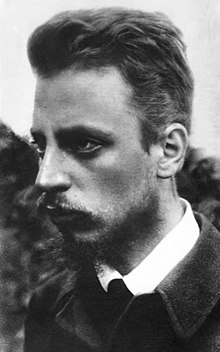
Back Rainer Maria Rilke Afrikaans Rainer Maria Rilke ALS راينر ماريا ريلكه Arabic راينر ماريا ريلكه ARZ Rainer Maria Rilke AST Rayner Mariya Rilke Azerbaijani راینر ماریا ریلکه AZB Райнер Мария Рильке Bashkir Райнер Марыя Рыльке Byelorussian Райнэр Марыя Рыльке BE-X-OLD
| Rainer Maria Rilke | |
 | |
| Statsborgarskap | Tyskland, Austerrike, Austerrike-Ungarn |
| Fødd | 4. desember 1875 Praha |
| Død |
29. desember 1926 (51 år) |
| Yrke | skribent, lyrikar, skodespelforfattar, omsetjar, romanforfattar |
| Språk | tysk |
| Sjanger | Dinggedicht, prosa |
| Ektefelle | Clara Westhoff, Nimet Eloui |
| Born | Ruth Sieber-Rilke |

| |
| Rainer Maria Rilke på Commons | |
Rainer Maria Rilke (4. desember 1875–29. desember 1926), fullt namn René Karl Wilhelm Johann Josef Maria Rilke, var ein tyskspråkleg lyrikar frå Austerrike-Ungarn.[1] Han er kjend som ein idiosykcratisk og ekspressiv diktar som har hatt stor tyding for tysk litteratur.[2] Verket hans er blitt rekna for å ha undertonar av mystisisme, og tek for seg tema som subjektiv oppleving og mistru.[3][4][5]
I tillegg til dikt skreiv han òg forteljingar, éin roman og tekstar om kunst og kultur, og stod dessutan for talrike omsetjingar av litteratur og lyrikk frå mellom anna fransk til tysk. Den omfattande brevvekslinga hans er ein viktig del av det litterære verket hans. Rilke reiste vidt kringom i Europa, og slo seg til slutt ned i Sveits, som også inspirerte fleire av dikta hans. I tillegg til det tyske verket sitt skreiv Rilke også på fransk. Seinare på 1900-talet fann verket hans eit nytt publikum gjennom siteringar i sjølvhelpsbøker,[6][7][8] andre bøker, fjernsynsprogram og filmar.[9]
- ↑ Köhnen, Ralph M. (2003). Neue Deutsche Biographie, Band 21.
- ↑ Biography: Rainer Maria Rilke 1875–1926, Poetry Foundation website. Henta 2. februar 2013.
- ↑ Müller, Hans Rudolf. Rainer Maria Rilke als Mystiker: Bekenntnis und Lebensdeutung in Rilkes Dichtungen (Berlin: Furche 1935)
- ↑ Stanley, Patricia H. "Rilke's Duino Elegies: An Alternative Approach to the Study of Mysticism" in Heep, Hartmut (red.). Unreading Rilke: Unorthodox Approaches to a Cultural Myth (New York: Peter Lang 2000).
- ↑ Freedman 1998, s. 515.
- ↑ Komar, Kathleen L. "Rilke: Metaphysics in a New Age" in Bauschinger, Sigrid and Cocalis, Susan. Rilke-Rezeptionen: Rilke Reconsidered (Tübingen/Basel: Franke, 1995), pp. 155–169. Rilke reinterpreted "as a master who can lead us to a more fulfilled and less anxious life".
- ↑ Komar, Kathleen L. "Rethinking Rilke's Duisiner Elegien at the End of the Millennium" in Metzger, Erika A. A Companion to the Works of Rainer Maria Rilke (Rochester, New York: Camden House, 2004), pp. 188–189.
- ↑ See also: Mood, John. Rilke on Love and Other Difficulties (New York: W. W. Norton & Company, 1975); and a book released by Rilke’s own publisher Insel Verlag, Hauschild, Vera (ed.), Rilke für Gestreßte (Frankfurt am Main: Insel-Verlag, 1998).
- ↑ Komar, Kathleen L. "Rethinking Rilke's Duisiner Elegien at the End of the Millennium" in Metzger, Erika A., A Companion to the Works of Rainer Maria Rilke (Rochester, New York: Camden House, 2004), 189.